Blue light sleep problems are getting worse, and people are starting to notice. Every night, millions are scrolling through their phones, laptops, and tablets, bathing their eyes in artificial blue light without even realizing how it’s affecting them. But what if I told you this simple habit is quietly destroying your sleep quality? In this article, we gonna explore how blue light effects on melatonin, why it’s messing up your circadian rhythm, and most importantly, how to block blue light to rescue your sleep.
What is Blue Light Sleep Disruption and Why Does It Matter?
Blue light is a part of the visible light spectrum that have a short wavelength and produces high amounts of energy. It’s everywhere — the sun emits it naturally, but digital devices like smartphones, computers, and LED lighting bombard us with artificial blue light at levels that confuses our brain.
Here’s the deal: Blue light sleep disruption occurs because our brain associates blue wavelengths with daylight. Exposure to blue light after sunset tricks your brain into thinking it’s still daytime. This suppresses melatonin production, which is the hormone that tells your body it’s time to sleep.
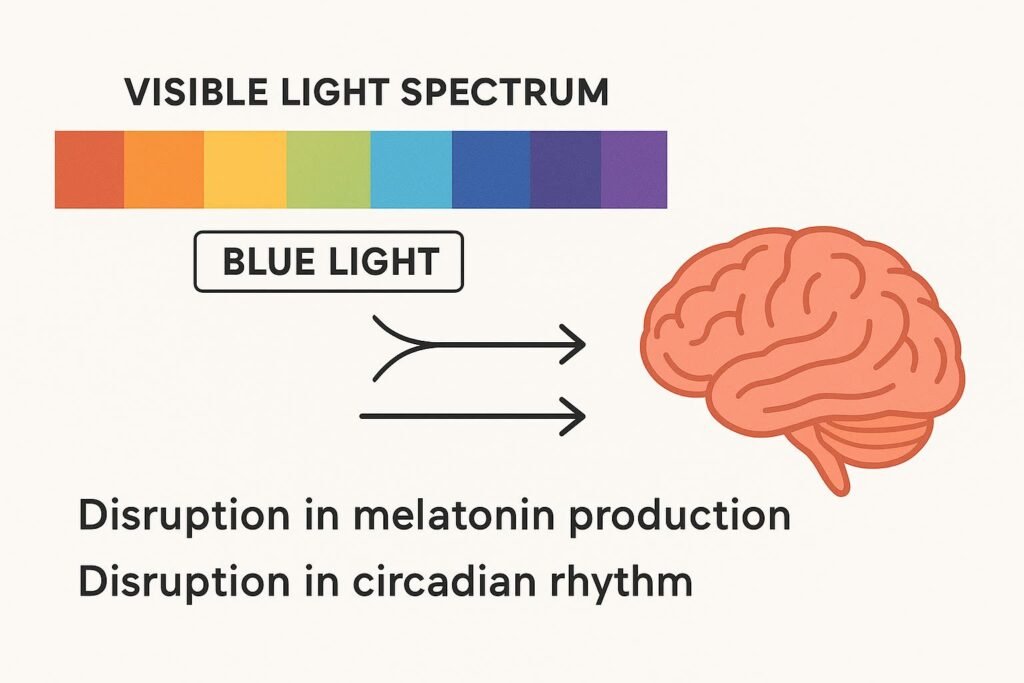
The Science Behind Blue Light Sleep and Melatonin Suppression
Melatonin is often referred to as the “sleep hormone” because it regulates your sleep-wake cycle. When the sun sets, your brain’s pineal gland starts producing melatonin to make you sleepy. But when you’re exposed to blue light at night, this process gets interrupted.
Studies shows that blue light effects on melatonin production can delay its release by up to 3 hours, leading to difficulty falling asleep, restless nights, and poor sleep quality. That’s why people who spend a lot of time on screens before bed often report insomnia-like symptoms.
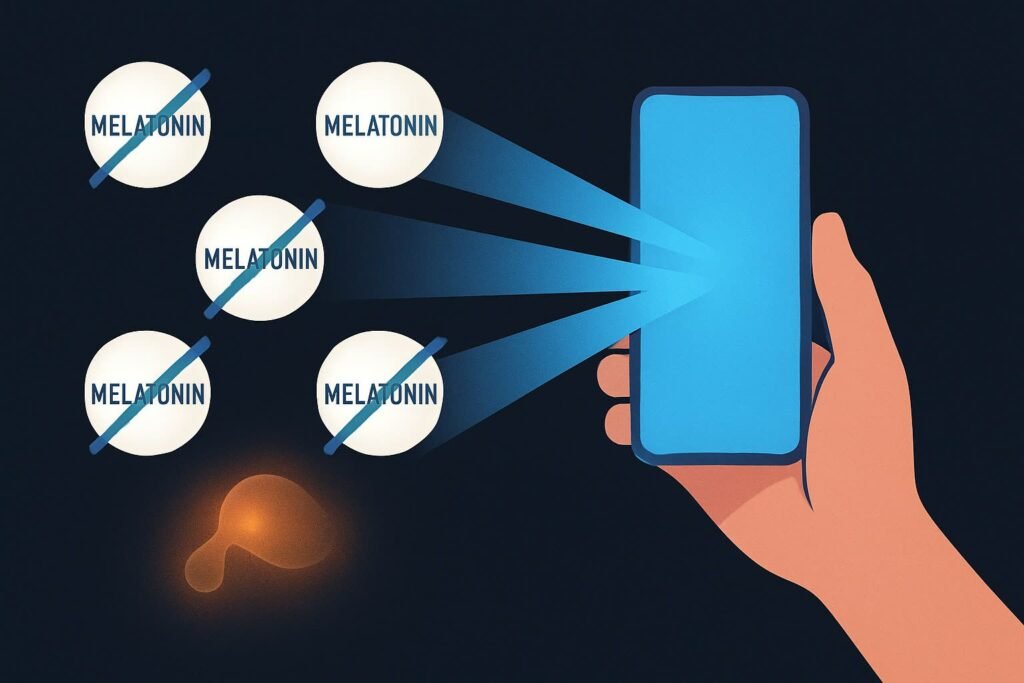
How Blue Light Sleep Disrupts Your Circadian Rhythm
Your circadian rhythm is your body’s internal clock, and it’s very sensitive to light cues. Blue light exposure at night disrupts this rhythm, causing what experts call “social jet lag.”
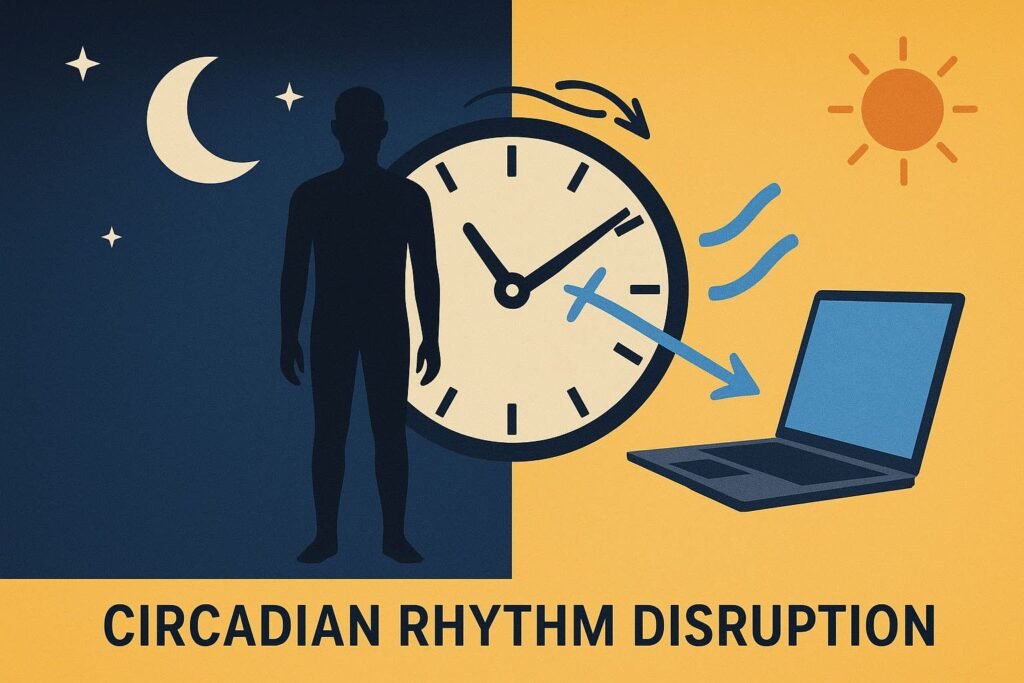
You might feel tired in the morning even if you slept 8 hours because your body’s biological night was pushed back.
Even worse, chronic circadian rhythm disruptions have been linked to metabolic disorders, mood swings, and increased risk of chronic illnesses. So, blue light sleep interference isn’t just about feeling sleepy—it’s about your overall health.
Signs That Blue Light Is Messing Up Your Sleep
Wondering if blue light is affecting your sleep? Here are some common signs:
Trouble falling asleep despite feeling tired
Waking up groggy even after a full night’s sleep
Frequent night awakenings
Feeling more alert at night (wired but tired)
Increased screen time in bed
If you’re experiencing any of these, it’s time to learn how to block blue light effectively.
6 Powerful Ways to Block Blue Light Sleep Disruptors
Now that you understand how blue light effects on melatonin and sleep, let’s look at actionable ways to reduce its impact. Here’s how to block blue light in daily life:
1. Use Blue Light Blocking Glasses to Combat Blue Light Sleep Problems
These glasses are designed with special lenses that filter out blue wavelengths. They’re one of the simplest and most effective ways to protect your eyes.
👉 Check out top-rated blue light glasses on Amazon
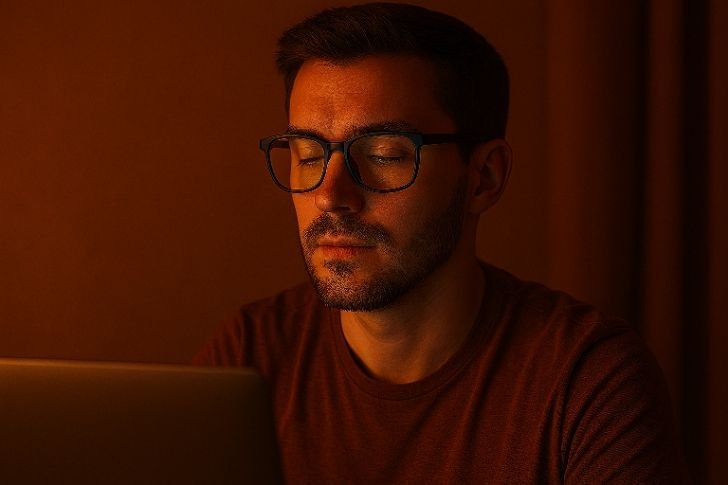
2. Enable Night Mode on Devices to Reduce Blue Light Sleep Effects
Most modern smartphones, tablets, and computers have a “Night Shift” or “Night Mode” setting that reduces blue light emissions by giving the screen a warm, amber tint.
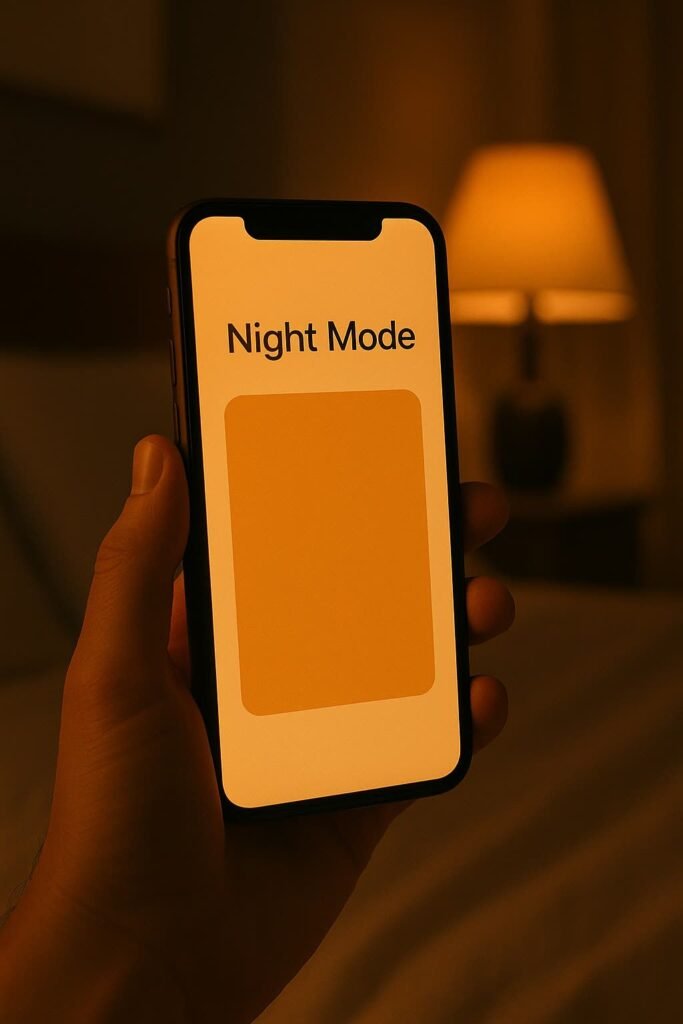
3. Install Blue Light Filtering Apps to Minimize Blue Light Sleep Exposure
If your device doesn’t have a built-in night mode, you can download apps like f.lux or Twilight to automatically adjust screen lighting according to the time of day.
4. Switch to Warm Lighting to Improve Blue Light Sleep Hygiene
Switch out bright, cool-toned LED bulbs in your home with warm, dim lighting for evening hours. Consider using Himalayan salt lamps or low-wattage incandescent bulbs.
🛒 Shop for Himalayan Salt Lamps on Amazon
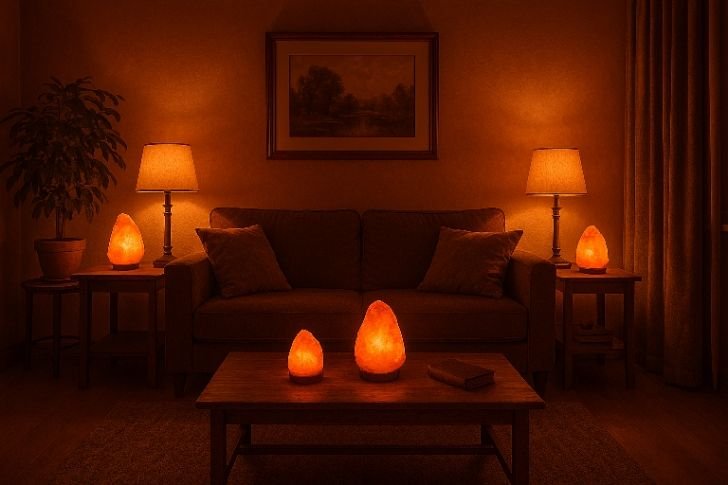
5. Set a Digital Curfew to Avoid Evening Blue Light Sleep Disruptors
Try to avoid screens at least 1-2 hours before bedtime. Instead, unwind with activities that doesn’t involve devices, like reading a physical book, journaling, or doing light stretches.
6. Use Screen Protectors for Blue Light Sleep Defense
Apply screen protectors that filter out blue light directly onto your devices. These are particularly useful if you have to work at night.
👉 Find screen protectors on Amazon
• Sleeping environment isn’t just about lighting. The way you position your body at night plays a critical role in digestion and gut health. [Choosing the right sleep position is key for gut health — read this guide to find out why.]
Lifestyle Habits That Improve Blue Light Sleep Hygiene
While gadgets can help, lifestyle habits play a huge role in minimizing blue light sleep disruption. Here’s what you should do:
Morning Sunlight Exposure
Expose yourself to natural sunlight first thing in the morning. This helps reset your circadian rhythm and enhances melatonin production at night.
Optimize Your Evening Environment
Dim the lights in your home after sunset. You can even try red-light therapy devices, which have been shown to promote relaxation and improve sleep quality.
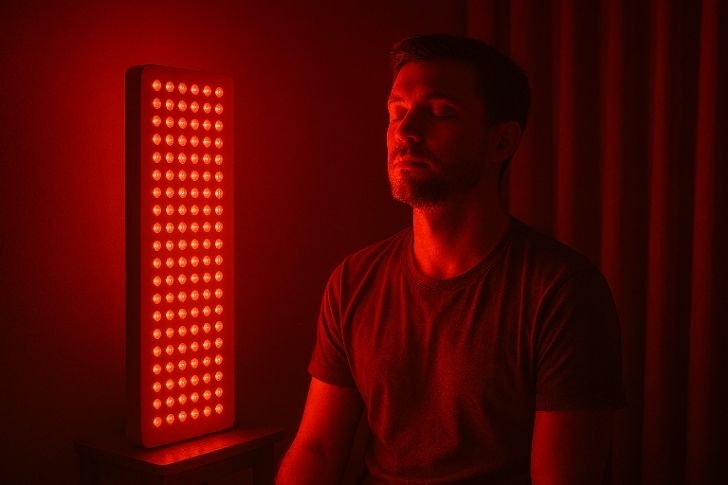
Browse red light therapy devices on Amazon
Mindful Screen Time
Be conscious of how much time you spend on screens, especially in the evening. Set app usage limits if needed to create healthy digital boundaries.
The Long-Term Health Impact of Ignoring Blue Light
Ignoring the impact of blue light sleep disruption can have cumulative negative effects. Chronic sleep deprivation is linked to:
Weight gain and obesity
Increased risk of diabetes
Weakened immune system
Elevated cortisol levels (stress hormone)
Cognitive decline and memory issues
If that wasn’t enough, disrupted melatonin rhythms can even impair your gut health, contributing to digestive disorders and inflammation.
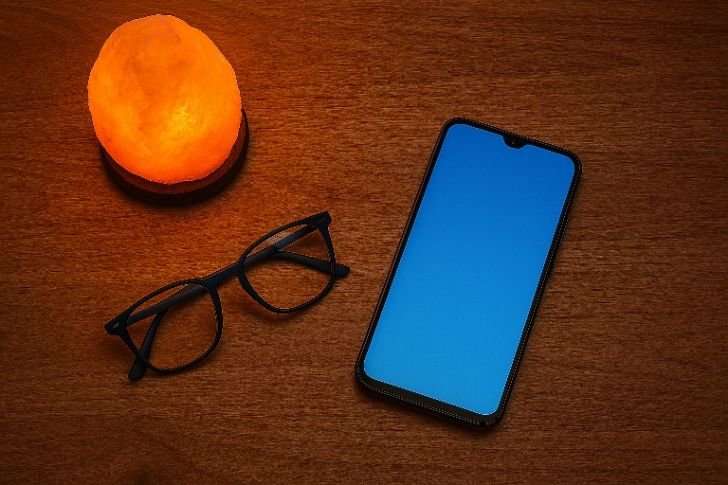
Recommended Products to Solve Blue Light Sleep Issues
Here’s a list of highly recommended products to help you fight blue light and improve your sleep hygiene:
1. Blue Light Blocking Glasses 🛒 See the latest design on Amazon
2. Himalayan Salt Lamps 👉 Check them on Amazon
3. Red Light Therapy Devices 🔗 Browse options here
4. Screen Protectors for Phones & Tablets 🛒 Available on Amazon
Download Your Free Evening Screen Detox Guide
Ready to take control of your nighttime routine and finally get better sleep? Download our Free Evening Screen Detox Guide packed with actionable tips, device detox strategies, and bonus relaxation techniques.
👉 [Download the Guide Here]
Final Thoughts
Blue light sleep interference is one of the sneakiest yet most fixable problems in today’s digital lifestyle. By understanding how blue light effects on melatonin, and implementing practical strategies on how to block blue light, you can dramatically improve your sleep quality and overall health. Remember, small daily changes can have huge impacts over time.
Don’t wait until sleep issues turn into chronic health problems. Start making these changes tonight.
For more guides on improving sleep and wellness, check out our related articles:
🔗 How cortisol affects sleep and gut health
🔗 Relaxing Bedtime Routine That Actually Works
